

There are about 1 billion mobile phones registered in China. In a country where love of gadgetry goes beyond the ordinary, the smartphone can do a lot more than just connecting one voice with another. Eric Jou tells you how it is changing the pace of life.
The sound of an alarm blares across the room. It's 8 am and Gao Xin gets out of bed, reaches over to his night stand to shut off the alarm. The object he grabs is not an alarm clock, it's his mobile phone.
The 30-year-old IT sales associate is among the growing number of people in China who are forgoing traditional technologies and gadgets in favor of the mobile phone. Their preference for mobile leans towards a device that is starting to change lifestyles - the smartphone.
"My phone is the first thing I reach for in the morning, and the last thing I put down before going to bed," says Gao. "I use my phone for everything from reading business reports, sending e-mails, reading books and watching videos during my commute."
Gao's story reflects a common habit. Glance across a Beijing metro carriage and you will see countless people heads down, watching videos, reading books, and playing games.
And, instead of using once dedicated devices such as PlayStations, Kindles, or iPods, they are using smartphones.
|
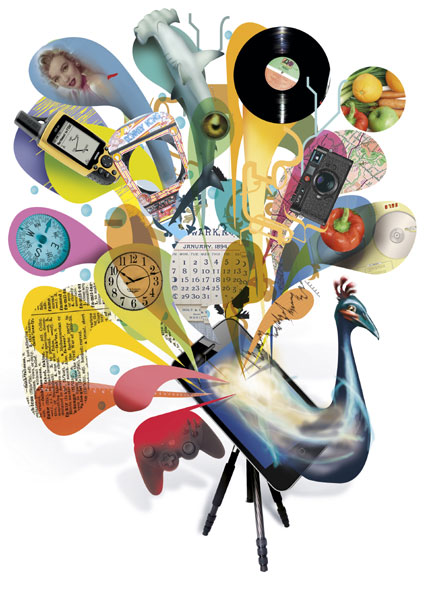 |
|
[Graphics by Guillermo Munro / China Daily] |
Mobile phone penetration in China, according to a recent report by the Ministry of Telecommunications, has now reached more than 1 billion users.
With China's population currently at 1.37 billion, that means an overwhelming majority of people in China uses mobile phones. Some may even have two, or more.
Consulting and analysis company Canalys says China accounted for more than 22 percent of the world's smartphones in the first quarter of 2012. Canalys expects smartphone shipments to continue to grow.
Motorola Mobility's vice-president of the Asia Pacific, Shen Bin, says that evolution of the mobile phone has made the smartphone a "window into content" for the masses.
"The cost curve is going down really quickly on all these technology components. You have, overall, a brick phone to a clamshell phone, and the capability has seen a multiple increase every year," Shen says.
"The phone was an elite business class item before but now you see everybody using phones. Even my boys are using phones to play games. The cost really helps mass market adoption and it's going down because of technology breakthroughs."
As one of the biggest names in mobile phone, Motorola Mobility has been around since the dawn of the original device. Known for having the best selling non-smartphone, the Motorola Razr, Motorola Mobility is now focusing on selling smartphones.
|
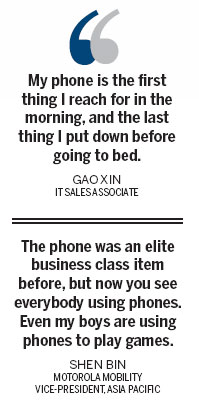 |
"A lot of the features the Chinese consumer wants are the same as the global trends. Motorola was the first company to have handwriting software for smartphones, and that is very country-specific to China.
"Motorola also leads in having dual SIM cards because we detected China's needs."
Shen points out that modern smartphones are much more than phones because the technology is there to enable more features.
Modern smartphones like Shen's own Motorola Razr Maxx has big touch screens, high definition cameras with flash, GPS, and Internet and video gaming capabilities, eclipsing phones of the past that could only handle text messaging and voice calls.
Carl Pei, international marketing manager at Chinese electronics maker Meizu, says more and more consumers are recognizing the importance and use of the smartphone.
Meizu, which started making products such as portable media players, has only been in the mobile phone business for three years.
"We saw early that the smartphone would eclipse the music player market and become a mainstream product," says Pei, "Serious development on our first smartphone, the M8, started in 2008."
Meizu is not the only company making smartphones in China.
Just as Shen of Motorola says, the price of the technology is becoming cheaper and more full-functioned smartphones are available at better prices.
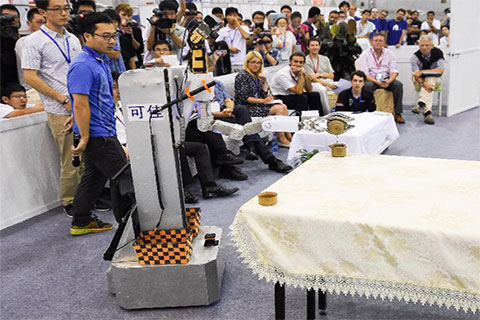 Robot 'Kuka' performs during 19th Robocup in China
Robot 'Kuka' performs during 19th Robocup in China
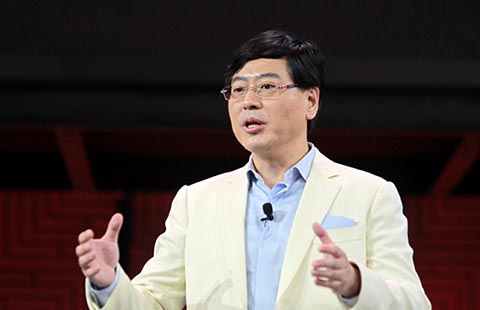 Top 10 best-paid H-share listed CEOs
Top 10 best-paid H-share listed CEOs
 Man overcomes disabilities to build thriving business
Man overcomes disabilities to build thriving business
 Top 10 smartphone brands that lead China Mobile's 4G business in Jan-May
Top 10 smartphone brands that lead China Mobile's 4G business in Jan-May
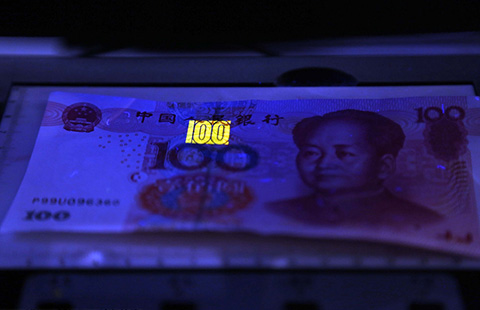 Identifying counterfeit money
Identifying counterfeit money
 Top 10 services changed by O2O
Top 10 services changed by O2O
 The dying of craft of repairing pans
The dying of craft of repairing pans
 Top 10 Chinese companies by revenue in 2015
Top 10 Chinese companies by revenue in 2015